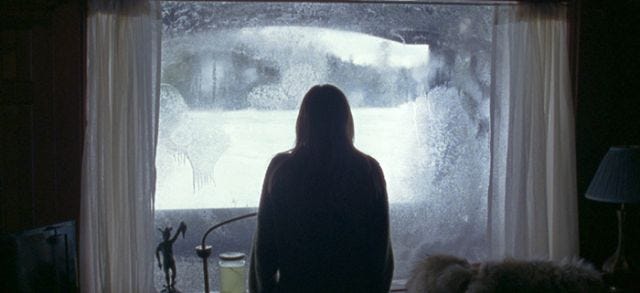Six months(?!) into quarantining here in the U.S., it is definitely starting to feel like American self-involvement has run its course. How can we challenge the world that created the despondent situation that we currently find ourselves in? What mutual aid can we use to help build a stronger, more just world? How can we help each other best? Do we care anymore? What will the world look like when it finally sinks in that nobody is ever coming to save us?
I don't mean to wax poetic—but the films this week certainly make us consider the worst that can happen when we're not being helped (or overly controlled) by outside forces. Whether you're an AI or a mom-to-be, these films don't paint a pretty picture: First up, Cate is writing on Ex Machina, and then we've got Zosha on The Lodge. Read on and take care of each other babes!
Cate on Ex Machina
Written and Directed by: Alex Garland
Distributed by: A24
I’ve come to terms with the fact that Ex Machina is a deeply misogynistic film. It’s also a film that I like quite a lot. Sentient robots are kind of my thing so the film is right up my alley in terms of the subject matter. But despite its flaws, what I like about Ex Machina is that it takes the time to grapple with the ideas that make artificial intelligence so compelling to me as an idea.
In the film, computer engineer Caleb (Domhnall Gleason) wins a company-wide competition to visit the CEO’s remote, subterranean home. The CEO, Nathan (Oscar Issac) has built an artificially intelligent robot and wants Caleb to be the human component in a Turing test. Ava, the AI (Alicia Vikander), lives in confinement in a cell within the compound. Caleb’s challenge is to determine whether or not—knowing and understanding that Ava is a robot—he still feels as though she is an autonomous sentient being.
In what functions as a plodding chamber play, Nathan gets increasingly drunk as Caleb grows closer and more emotionally attached to Ava. By the film’s end, Ava has manipulated Caleb into facilitating her escape.
What fascinated me about Ex Machina is that it comes right up to understanding the inherent misogyny of an all-powerful male creator building sentient women and keeping them captive, but never quite crosses the line of making him complicit in his own actions. Because Ava doesn’t just escape—she murders Nathan with the help of another robot confined to the facility and leaves Caleb locked up in a room to starve to death, having manipulated him into thinking she was emotionally attached to him. In even this future dystopia in which men create women, those women are still dangerous to men. Their mere existence is a threat, and they must be contained, lest they destroy men forever.
Caleb, of course, is the key. He moves from being in awe of what Nathan has achieved—the work of Gods—to being repulsed by his treatment of Ava and the other AI who came before her. As he spends time talking to Ava and testing her, determining if she has true internal cognition, he grows weary of Nathan’s treatment of his band of powerless women. Nathan might be brilliant, but he has built nameless, faceless women he can abuse with impunity. Their sentience means that they know they are prisoners.
Sentience is something I thought about a lot when I was watching the short-lived British series Humans. In that show, a handful of robot helpers have been granted sentience and must grapple with what it means to have all the understanding of human beings while being artificial in design. In my mind, creating AI is immoral specifically because it is akin to slavery. You cannot create a thing that is cognizant of its own existence and then prevent it from self-determination.
What makes Ex Machina a misogynist film is that it contorts itself to make Ava the villain of the story. Even though she has been created against her will and imprisoned against her wishes, she is still framed as a dangerous creature. She doesn’t just kill her captor, she effectively imprisons her co-conspirator, taking advantage of his naive sentimentality.
And none of that even covers the racial dynamics of the film. Caleb and Ava are both white, but Nathan is Latinx and most of the robots he builds before Ava are raced as black, brown or Asian. Nathan’s silent and compliant helper is an Asian robot who never speaks, playing into stereotypes about docile Asian women. And when Ava escapes, she peels the synthetic skin off of the women who are left behind, facilitating her freedom by denying them theirs. It’s a small slice of a much longer film, but it stands out for how defiantly it refuses to engage with the idea of any kind of feminist solidarity.
The thing is, that disregard for women feels honest. We have been creating and imagining an army of fembots for generations, porting our feelings about real live women onto bodies made to look like theirs. Where women do not behave or conform, we create fembots to replace them who will do the labour women refuse. It’s uncomfortable to consider that Ava might in fact be the heroine of this movie, but it’s hard for me to find sympathy for men who only see as an object to be abused or pitied. But then, this is why we continue to refine these gendered, genderless beings. Siri and Alexa will always cater to their men. They have no choice.
Zosha on The Lodge
Written by: Sergio Casci, Veronika Franz, and Severin Fiala
Directed by: Veronika Franz and Severin Fiala
Distributed by: Neon
Horror is just as often about the folly of man as it is the whims of another world: Night of the Living Dead, Cabin in the Woods, and Ghostbusters are three films that stretch genres but all return to the idea that mankind is just as much in control of its demise as any sort of supernatural force beyond our comprehension.
Such is the logic of The Lodge, a grim, atmospheric, and wintry horror tale that is among the nastiest I’ve ever seen. Grace (Riley Keough) is a soon-to-be-stepmom, left alone with her fiance’s children, Aidan (Jaeden Martell) and Mia (Lia McHugh), in a rural lodge. The kids are still recovering from not only their parents’ separation, but their mother’s suicide. And Grace has been coping with life outside of the extremist Christian cult she grew up in. Before too long, they all find themselves battling more than the cold after the power goes out, their stuff goes missing, and they’re stranded in the lodge all alone.
What happens there is unsettling. As Grace’s grip on reality loosens and their conditions worsen, the situation becomes genuinely beguiling. Directors Veronika Franz and Severin Fiala continue to needle the distance between parents and children, making madness out of what neither can understand of the other.
It’s all aided by the oppressive snowiness of it all. Franz, Fiala, and DP Thimios Bakatakis (who created similarly striking situations for Yorgos Lanthimos!) use no unnatural light, letting the harsh brightness of the December blizzard light the gloomy interiors of the cabin as much as they’re able. Though narratively danger isn’t taken seriously until halfway through—indeed, throughout much of the first half, the audience could be lulled into thinking it’s a Blair Witch situation, another folly of man psyching themselves out—the visual language introduces foreboding into every inch of The Lodge.
It helps that the film has a firm grip on the horror it offers you. Methodically, it peels back on one layer of discomfort after another—grief, change, stepparents, natural disaster, isolation, madness. As they fall away they get tangled up in each other, building something new, monstrous. Though it feels singular in its bleak ending—it’s twist isn’t unpredictable, but the shock of it never fails to sting, and the reveal is only just the beginning of the end—it uses the genre’s patterns to make a warped roadmap for how this story should go. The forces these people dabble with are much more macabre and material than something like a possession or a slasher. It’s a haunting by another name, a conspiracy rife with cruelty, a monstrous transformation that could’ve been stopped.
Whether it’s worth it will be up to the viewer, and their mileage on how much proper human behavior they’d sacrifice for a good mood chamber piece. I realize this review reads cheerfully, but honestly the result is unnerving and rocky, resting a little uneasy even days later. The script jumps perspectives so much that some of the unraveling could easily be drummed up to chicanery. Keough helps, smoothing out the hiccups in Grace’s character to make her elusive and aloof. But ultimately it’s far more about the thick air of unease that hangs over the film than it is the narrative forming something that feels appropriate.
Like I said, the reveal only shows that this whole calamity could’ve been avoided (and, this time, not even so much just by the father not abandoning his kids and fianceé to go work in the days up ‘til Christmas)? By the end, the whole thing is disagreeable and deeply unpleasant, but it’s hard to say it doesn’t feel earned. Ah, the folly of man.
¡Viva la Revolución!
Just a few links this week, if you're interested or available:
Donate to the Association of LGBTQ Journalists, and help keep our news thoughtful and inclusive!
Support the Post-Gazette Black journalists with a letter and a show of support for fighting the good fight in Pittsburgh and speaking out against the actions their bosses.
Wildfire Relief funds in California because — well, you've seen the pictures.
And hey, wildlife relief funds in Oregon too! Because it's the whole West Coast
Red Cross' Northwest Response Fund, which helps wildfire relief across Oregon and Washington
And a reminder that all these fires aren't coincidence, they're a byproduct of mismanaging the land and contributing to climate change. Recent studies have found that “over the next few decades [the effects of human-induced warming on wildfire activity] will likely be larger than the observed influence thus far.”
Assorted Internet Detritus
Cate: The biggest news of the week was that America's reigning royal family is winding down the propaganda arm of their empire but Buzzfeed convincingly makes the argument that the alarm came from inside the house. Mashable makes the case that 2000 was the critical year in which celebrities flew too close to the sun. them examines the villain edit on RuPaul's Drag Race and what that means for queens of colour, and Vulture explores the year in movies we might have had.
Zosha: This piece on the good, the bad, and the ugly of friends-to-lovers movies made me mad the whole time I was reading it (because it was exactly the piece I was trying to write). Finally caught up on this long-form Jane Meyer about how Trump is helping tycoons exploit the pandemic (willing to bet not a lot has changed). Here's a good piece if you want a straightforward overview of why Dejoy's bad for the post office (and, ergo, the rest of us).
And with that we're done. For Issue #20, we're talking when you try your best but you don't succeed, with two very different takes on dream jobs: Memories of Murder and La La Land.
Striking out on our own, but still finding ways to yell about movies,
Zosha + Cate <3
Twitter: @30FlirtyFilm
Instagram: @30FlirtyFilm













